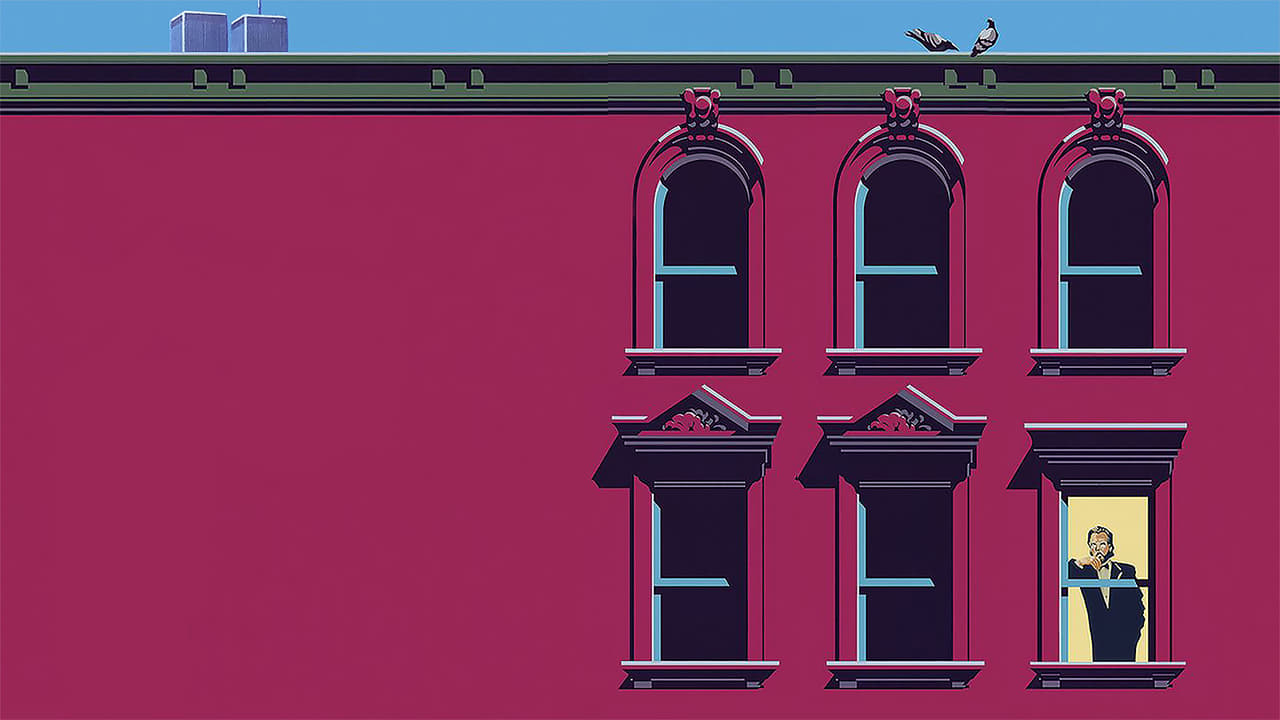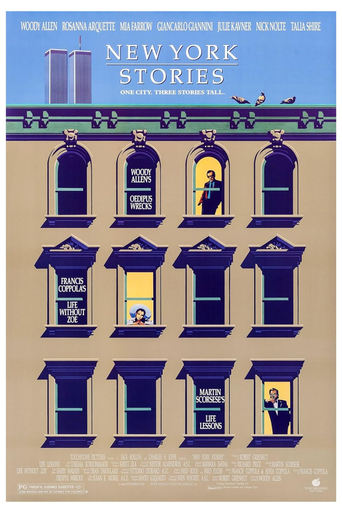FuzzyTagz
If the ambition is to provide two hours of instantly forgettable, popcorn-munching escapism, it succeeds.
Brendon Jones
It’s fine. It's literally the definition of a fine movie. You’ve seen it before, you know every beat and outcome before the characters even do. Only question is how much escapism you’re looking for.
Tobias Burrows
It's easily one of the freshest, sharpest and most enjoyable films of this year.
vothty
In these three short stories set in New York, Allen boils a funny but flavourless chicken, Coppola conducts a disastrous flute solo, and Scorsese paints a masterpiece.
moonspinner55
Three top directors (Martin Scorsese, Francis Ford Coppola, Woody Allen) helm three separate stories about denizens of the Big Apple. Scorsese, still in "After Hours" mode, works quite well with handsome, raffish Nick Nolte, playing an obsessive painter; Coppola, working from a dim script co-written with daughter Sofia, has nothing up his sleeve with a tale about a poor little rich girl; Allen wrote and co-stars with Mia Farrow in the best segment, a funny fantasy about a Jewish man at the mercy of his domineering mama. Snazzily-produced picture appears to have everything going for it in the talent department, but one is ultimately left undernourished by the final results. This project is rather obviously just a holding-pattern for the trio of filmmakers, and not enough heart makes it into the mix. ** from ****
blanche-2
I'll step out of the loop here about "New York Stories," three tales of New York from 1989, directed by three formidable directors: Martin Scorcese, Francis Ford Coppola and Woody Allen. I happen to think all three films had something to offer, and the fact that the Zoe sequence is about a child does not for me make it the weakest segment.I found the Scorcese segment starring Nick Nolte and Roseanna Arquette the most thought-provoking, the Zoe segment the most charming, and the Allen segment the wackiest. The first episode is about a tortured artist (Nolte) who expresses his sexual frustrations and problems with his young protégée (Arquette) in his work. She no longer sleeps with him and wants to quit New York and go home; he wants to kiss her foot and professes undying love for her. To Puccini's Nessun Dorma, he stares at his artwork and goes through a variety of emotions as he paints another masterpiece. This particular muse in the form of Arquette used up, one sees him at his art show connecting with another would-be artist/muse whose identity will also be lost in his genius.The second sequence, directed by Coppola, is a take-off on the Eloise stories by Kay Thompson. This little girl's name is Zoe. Her father, Claudio Montez (Giancarlo Giannini), is a famous flautist who travels, and her mother (Talia Shire) is a photo journalist who travels. Zoe lives with a butler and her dog Vegas at the Sherry Netherlands Hotel. She proves herself smarter than either parent in this charming film. My only question is why Giancarlo Giannini speaks Italian to his daughter when the name Claudio Montez is emphatically not Italian. Okay, it wasn't typical Coppola, but who said it had to be? The last one is pure Woody, Oedipus Wrecks, about a man with a nagging, critical mother who wants to marry a young woman (Mia Farrow) with children. He loves his mother, but he wishes she'd disappear. During a magic show, he gets his wish, when his mother goes into a magician's box and never comes out. Later she shows up in the sky telling him what to do, with the world as a witness. His girlfriend can't take it. He then goes to a psychic (Julie Kavner) who makes him a boiled chicken dinner. A complete delight.Three different, interesting stories by three great directors.
jzappa
New York Stories is another anthology film that I was suckered into because of the credentials. Other anthology films that I've seen, like Four Rooms, have not been very good despite the amazing credentials. I haven't been a fan of most movies with more than one director, hence more than one vision thus many colliding like an orchestra playing unharmonious notes. New York Stories is satisfactory however, eve if its mood swings leave one feeling many different ways about it. You'll feel stimulated, yet strangely unfulfilled.Martin Scorsese's segment, Life Lessons, is very melodramatic in that hardened, grungy way of his. Nolte gives a wonderful performance, very intense, and Arquette is very realistic and effective. Scorsese employs his usual machine gun multi-genre soundtrack and plunging, stylistically passionate and energetic cinematography. His segment says something very profound and important about the human characteristic of selfishness and how much more abundant it is in ourselves than we care to accept.Then comes Francis Ford Coppola's segment, Life Without Zoe. Arg. The acting, despite the leniency one may generously give child actors, is awful. Heather McComb did in fact fill out very very nicely when she grew up, but that does not excuse her very scripted performance here. She's the least of the cast's problems, though. Everyone sounds like the salesmen on the used car commercials. The story is something quite silly. Perhaps it would be fine if it were its own film, but Coppola had to know that he was being teamed with Scorsese, his fellow creator of quintessential Mafia cinema, and Woody Allen, the prolific source of mature and sophisticated comedies about sex and relationships. Did he submit this segment for shock value? I guess so. Well, it worked. I don't understand why Coppola works with kids. His daughter Sophia, who at age 18 here co-wrote the script and designed the costumes, did in fact go on to become a fine director herself, but did he not notice his pattern after awhile? He makes The Conversation, the Godfather films, and Apocalypse Now, and we think he's found his niche. Then he starts making movies like this, following up with films like Jack with Robin Williams.Woody Allen's segment saves the film. I suppose this is one way anthology movies are interesting. In a single feature-length narrative film, when it takes a plunge in the middle, it can't really be saved in the end, especially if it was as bad as Coppola's segment. In an anthology, if the middle of the movie is terrible, you still have the end to look forward to. This is the case in New York Stories, because Woody Allen's segment, Oedipus Wrecks, the final third of the movie, is hilarious. It's one of the funniest satires he's ever done of the Jewish Brooklynite's culture. It's goofy in a subtle way, and fascinatingly surreal the way a lot of Allen's best and most creative work is. Actually, Oedipus Wrecks is perhaps the only one of the three parts that actually clearly represents a hue of New York's culture. Scorsese's part didn't represent New York as much as it represented the emotional tempests of an artist and happened to take place in the meatpacking district. Coppola's mid-section represented the lives of wealthy children whose lives are so free that they live practically like very spoiled and gossipy adults, but to such an outlandish degree of family-oriented fantasy that it's not at all credible. Woody Allen firmly focuses upon his division of New York culture. And by the by, it's a very pleasant surprise to see a younger Larry David, pre-Seinfeld and pre-Curb Your Enthusiasm, in a bit role in Oedipus Wrecks.Whatever was going through Coppola's mind, it's because of him that New York Stories can be described as a film in the shape of a circular saw. It's on one level, then takes a ninety- degree plunge to a different level, then again with the third segment it takes a ninety-degree ascension to the precise level it was at before.

